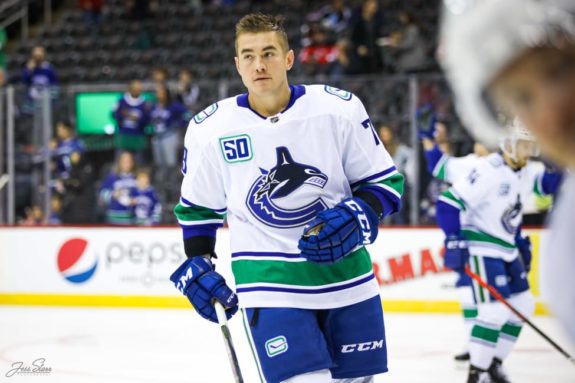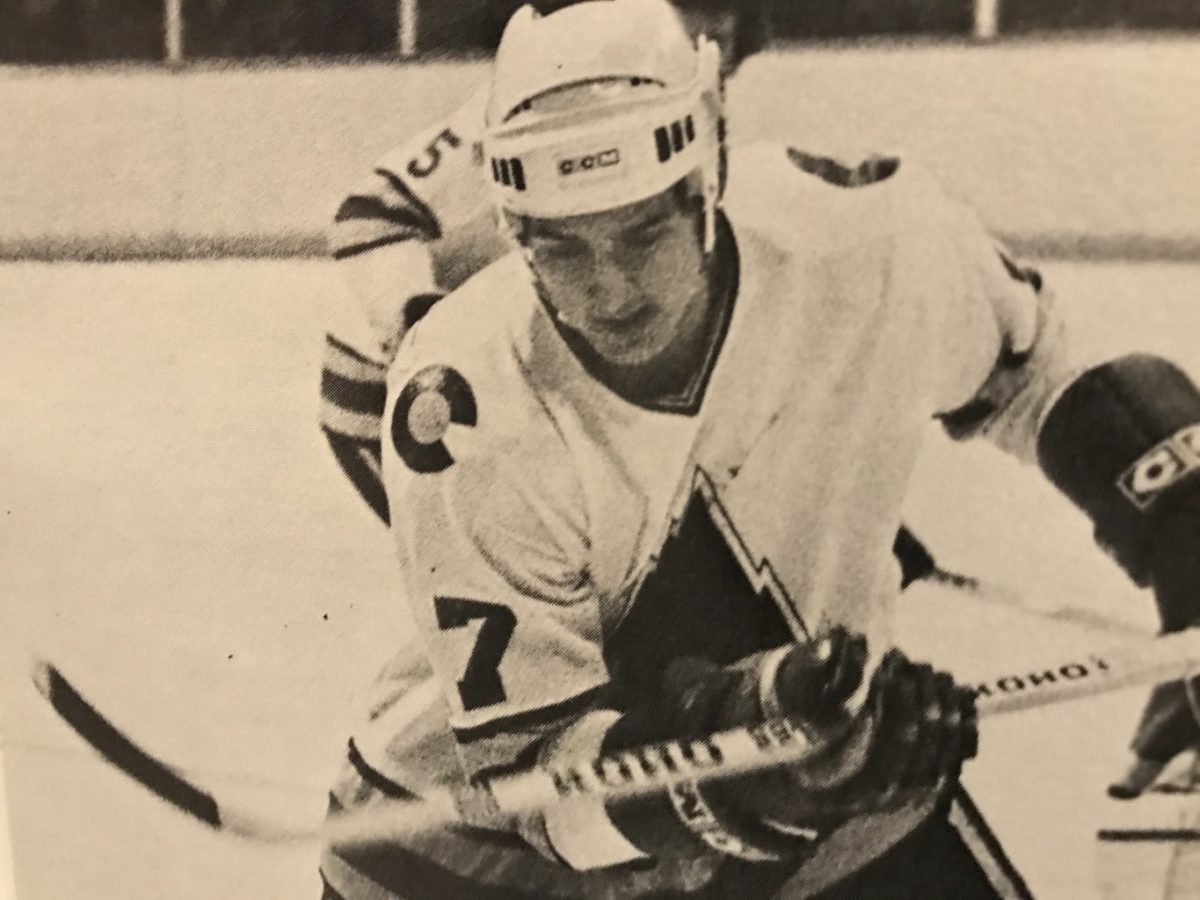The Vancouver Canucks have used the month of March to honour different cultural celebrations, hosting special events at Rogers Arena before games. Lunar New Year, Pride Night and International Women’s Day were three themes that received a lot of praise and positive attention, with members of specific communities being honoured for their work. The Canucks kept one tradition that has been running for the last three seasons: Indigenous People’s Night at Rogers Arena, which pays homage to Indigenous communities in Vancouver and across British Columbia.
The team showed its appreciation towards Indigenous people before its game against the Edmonton Oilers. Young Indigenous athletes were honoured for their achievements, and a member of Squamish First Nation performed the national anthem. Goaltender Thatcher Demko wore a specially-made helmet that was decorated with Indigenous artwork, and he guided his team to a 2-1 victory.
Many Indigenous players have represented the Vancouver Canucks over the years. The most recent player is former Canucks defensemen Travis Hamonic, who grew up in rural Manitoba and is of Métis descent. Hamonic was with the Canucks from July 2020 until March 2022, and he has shared one common trait with other Indigenous hockey players: he is heavily involved in working with First Nations communities in Western Canada. These three Indigenous Canuck players have similar stories to tell: they struggled financially, battled addiction, and they fought to overcome racism in the sport. Their stories have inspired many others to play hockey.
Micheal Ferland
Micheal Ferland was born in Swan River, Manitoba and was raised with his two siblings in a single-parent family. His older sister was unable to play competitive sports due to financial limitations in the family, and she provided some funding for her brother to play hockey. Ferland’s family used the Manitoba Métis Federation for money to buy hockey equipment, and the families of his teammates paid his enrollment fees while he was playing for the Brandon Wheat Kings.

Ferland played for the Calgary Flames for four seasons before he was traded to the Carolina Hurricanes in 2018. He spent one season in Raleigh and moved to the Vancouver Canucks in 2019, signing a four-year deal. He scored five points (one goal, four assists) in 19 games during the 2019-20 season. He has been absent from the team due to recurring injuries, and this has subsequently limited his playing time, but he now plays for the Utica Comets.
The move to Vancouver had a personal connection for Ferland, as he was reunited with former Canuck Gino Odjick. Ferland battled alcoholism when he was in his early 20s, and Odjick helped him to overcome the addiction. Odjick is Indigenous and battled addiction during his playing career, and he provided Ferland with a support network. Ferland praised his help, and the forward celebrated one year of sobriety in March 2015.
Gino Odjick
Odjick is perhaps the most notable Indigenous player to play for the Canucks, having spent eight seasons in Vancouver and scored 88 points (47 goals, 41 assists). He was drafted in the fifth round of the 1990 NHL Entry Draft and had the opportunity to share a line with Hall of Fame inductee Pavel Bure, where Odjick gained a reputation for being a physically strong winger. He won the respect of the Canucks fans, but his difficult upbringing meant that he had to work even harder to pursue his hockey dream.

Odjick was born in an Algonquin Native Reserve on the outskirts of Maniwaki, Québec. He was one of six children, and his parents helped the family to raise up to 32 foster children. His father, Joe, played hockey while he was attending a residential school and coached children on the reserve. Gino started playing team hockey when he was 11 years old, and he stayed with local teams from different reserves until he was 15. He initially played as a defenseman and switched to forward after he joined the Hawkesbury Hawks, a minor team from Ontario. He started to become a fighter on the ice, which he credited to racial tensions between neighbouring reserves.
Odjick registered 200 penalty minutes in six of his eight seasons as a Canuck, but his biggest battle was not on the ice. He was diagnosed with primary amyloidosis — a rare blood disorder — and suffered a heart attack due to drugs he had been prescribed. He underwent experimental treatment and was given months to live, but the treatment worked and he is now in good health.
Ron Delorme
Ron Delorme has served as a scout for the Canucks since 2000. He has the nickname “Chief” due to his Métis and Cree heritage, and he was one of the first Indigenous players to promote hockey in First Nations communities. His work earned him many honours, including a star blanket, which is given to respected members of Aboriginal communities. (from ‘Ed Willes: Role model Delorme deserving of ‘star blanket’ treatment on, off ice,’ The Province, 07/12/2018)

Delorme was born in North Battleford, Saskatchewan. The Kansas City Stars drafted him in the 1975 NHL Entry Draft, and he signed wth the Colorado Rockies one year later. He played more than 300 games as a forward for the Rockies, moving to Vancouver in 1981. He was regarded as a tough player in his four seasons with the Canucks, scoring 37 points (14 goals, 23 assists) before retiring from playing in 1985.
You may also like:
- NHL Rumors: Islanders, Oilers, Capitals, Canucks
- 3 Most Probable Teams to Sign Anton Stralman
- NHL Rumors: Ducks, Canucks, Bruins, Flames, Blues
- 3 Canucks Poised for Bigger Roles in 2022-23
- Canucks Have the Makings of a Playoff-Ready Fourth Line
Delorme has campaigned for the inclusion of Indigenous people in professional sport. He makes frequent visits to reserves to coach teams, to share his life story and to teach others about hockey. He also spoke of his admiration for Fred Sasakamoose, the first Indigenous player to play in the NHL. Sasakamoose died in 2020 due to complications with COVID-19, and Delorme has said that he intends to continue Sasakamoose’s legacy alive through working with Indigenous people.
Canucks’ Indigenous Players Have Fought to Play the Sport
The stories of former and current Indigenous Canucks’ players are familiar within the hockey world. They all came from similar backgrounds, often low-income families and worrying that financial limitations would prevent them from ever making the NHL. Others suffered racial abuse during their careers, and this provided some motivation to prove the doubters and the abusers wrong. These life lessons gave these players a chance to give back to Indigenous communities and to show Indigenous people that pursuing a hockey career is not impossible.
You may also like:
- NHL Rumors: Islanders, Oilers, Capitals, Canucks
- 3 Most Probable Teams to Sign Anton Stralman
- NHL Rumors: Ducks, Canucks, Bruins, Flames, Blues
- 3 Canucks Poised for Bigger Roles in 2022-23
- Canucks Have the Makings of a Playoff-Ready Fourth Line
The Canucks include Indigenous people’s night as a part of the “Hockey Is For Everyone” initiative. The goal of the event is to celebrate the cultures of different ethnic groups, including First Nations communities across the province of British Columbia. Odjick, Ferland, and Delorme have played for the Canucks and have provided one important life lesson: anyone can play hockey, regardless of ethnic background, nationality, or religion.
